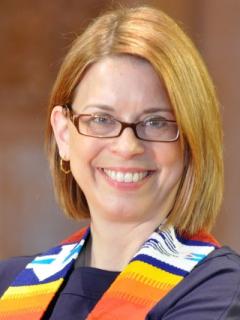Some Thoughts on Dismantling Systemic White Supremacy

Rev. Sharon Dittmar
I recently attended the second part of an online course by the Adaway Group entitled, Whiteness at Work with the MidAmerica program staff. The workshop is designed for white people. The second session introduced us to the “Cycle of Socialization,” how American culture socializes its residents (particularly white residents) to inherit and replicate systemic white supremacy. Not surprisingly, we are socialized before we have words by family, media, teachers, and institutions (including religious). In my mind, it is like “drinking the Kool-Aid.” And, this socialization is deadly for BIPOC and historically marginalized groups.
Like many of you who are white, I have spent a lot of time thinking about this. Robin D’Angelo’s White Fragility showed me how my white guilt is not useful (it does not change any systems – rather it keeps things in place). Ibram X. Kendi’s How to Be an Antiracist challenged me to make daily choices to act like an anti-racist instead of playing down differences or ignoring racism. As Kendi notes, this is daily work and a constant work in progress.
It is clear to me that I will never be “woke.” I am waking, and I hope to continue to wake for as long as I live. I am beginning to adjust to the fact that I make continual mistakes, even as I learn. I don’t like this reality, because someone else gets hurt when I make mistakes. As a white person, I have an unfair amount of power and privilege given to me by historic racism and the cycle of socialization.
Parker Palmer writes, “When the going gets tough, turn to wonder.” I think about this now as well. How can I change systemic (institutional such as legal, political, housing, medical, educational, and religious) and structural (cumulative and compounding impact across institutions) racism? I ask myself a lot of internal questions while on this journey. What stakeholder is not at this table? What can I do to create a system where individuals can bring their full selves and acquire equitable outcomes? Who has more to teach me that I need to learn? Where can I find accountability?
I do more listening, observing, and reflecting than ever, and I continue to find myself part of the problem. And, this is the work. I am grateful I do not need to remain in my ignorance or guilt. There are so many dichotomies between what I was taught and what is, and so much historic and current pain, violence, and loss. Holding all of this long enough to learn from it is my work. This is where my change happens. As Marge Piercy writes, “The pitcher cries for water to carry and a person for work that is real.”

